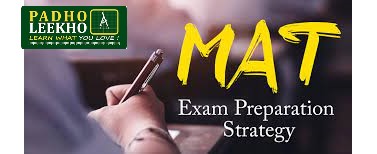Unlock Exclusive Access To MAT Course Materials.
1. MAT EXAM 2024 COURSES
Score High in MAT Exam with Padho Leekho
Management Aptitude Test (MAT) is a leading MBA entrance exam providing admission to 600+ B-schools across India.
At Padho Leekho, our specialized MAT coaching program helps you master the exam and get into your target business school.
Our Unique MAT Preparation Methodology
1. 500+ Hours of MAT Video Lectures
Get access to 500+ hours of HD video lectures covering the complete MAT syllabus including QA, DI, LR, and English. The videos explain key MAT theories, formulas, and strategies.
2. 5000+ MAT-style Questions
Our extensive MAT question bank with 5000+ questions is designed to help you gain conceptual mastery and exam readiness through rigorous practice.
ENROLL For MAT Exam Test Series
3. MAT Exam Workshops
Attend our MAT workshops to learn specific exam techniques – from effective time management, and overcoming test anxiety to reading comprehension strategies.
4. 25+ MAT Mock Tests
Writing mocks is key for MAT’s success. We provide 25+ MAT mock tests for performance benchmarking and focused improvement in weak areas.
5. 1-on-1 MAT Mentoring
Our experienced mentors provide personalized guidance to each student for their MAT preparation planning, execution, doubt clearing, and more.
6. Proven MAT Results
With 10+ years of coaching experience, Padho Leekho has helped thousands of students successfully get into their target MAT colleges. Our structured MAT coaching works!
Join us today and get the MAT exam ready. Your management dreams are closer than you think!
The MAT (Management Aptitude Test) is a standardized test conducted in India for admission to various management programs in different B-schools and business management institutes.
It is typically conducted by the All India Management Association (AIMA) four times a year in February, May, September, and December.
Analysis of the MAT exam:
-
Exam Structure:
(i) The MAT exam consists of multiple-choice questions (MCQs) and is conducted in both paper-based and computer-based formats. The computer-based test is available throughout the testing window, while the paper-based test is conducted on specific dates. (ii)The test comprises five sections: Language Comprehension, Mathematical Skills, Data Analysis & Sufficiency, Intelligence and Critical Reasoning, and Indian and Global Environment.
-
Test Duration:
The exam duration is usually 2 hours and 30 minutes for the paper-based test and 2 hours and 30 minutes for the computer-based test.
-
Scoring:
MAT is typically scored on a scale of 200 to 800. Each section carries a maximum score of 40 marks, and there are a total of 200 questions.
ENROLL For MAT Test Series
-
Difficulty Level:
The difficulty level of MAT can vary from year to year, but it is generally considered to be of moderate difficulty when compared to other management entrance exams like CAT, XAT, or SNAP.
-
Eligibility:
The eligibility criteria for MAT can vary depending on the participating B-schools and their individual admission requirements. However, in general, candidates need to have a bachelor’s degree in any discipline to be eligible.
-
Test Pattern:
The MAT exam is divided into the five sections mentioned above, and each section contains 40 questions. The questions are generally of moderate difficulty, testing candidates’ language skills, quantitative aptitude, data interpretation, and critical thinking abilities.
-
Scoring and Negative Marking:
MAT does not have negative marking. So, candidates are encouraged to attempt all questions, as they won’t lose marks for incorrect answers.
-
Exam Dates:
MAT is conducted four times a year. The specific dates for the exam vary from year to year, and candidates need to check the AIMA website for the latest information regarding exam schedules and registration details.
-
Selection of B-schools:
The MAT score is accepted by numerous B-schools and management institutes across India. The list of participating institutes varies, and candidates can select the institutes they want to send their scores to during the registration process.
7. Preparation:
To prepare for the MAT exam, candidates should practice with previous years’ question papers, take mock tests, and study relevant study materials. Time management and section-wise preparation are crucial for success in MAT.
Analysis of the syllabus for each section:
-
Language Comprehension:
This section assesses a candidate’s language skills and comprehension abilities. The key topics include:
- Reading Comprehension: Understanding and answering questions related to passages.
- Vocabulary: Synonyms, antonyms, idioms, and phrases.
- Grammar: Error identification, sentence correction, and sentence completion.
- Jumbled Paragraphs: Arranging sentences to form a coherent paragraph.
-
Mathematical Skills:
The Mathematical Skills section evaluates a candidate’s quantitative and numerical ability. The syllabus covers topics such as:
- Arithmetic: Percentages, profit and loss, time and distance, time and work, ratio and proportion, and averages.
- Algebra: Linear equations, quadratic equations, and functions.
- Geometry: Basic concepts of lines, angles, triangles, and circles.
- Number System: Integers, fractions, decimals, and number series.
- Modern Mathematics: Permutations and combinations, probability, and set theory.
-
Data Analysis & Sufficiency:
This section tests a candidate’s ability to analyze and interpret data. Key topics include:
- Data Interpretation: Tables, bar graphs, line graphs, pie charts, and other data representation forms.
- Data Sufficiency: Analyzing whether the given data is sufficient to answer a particular question.
-
Intelligence and Critical Reasoning:
This section assesses logical and critical thinking skills. Topics covered include:
- Critical Reasoning: Strengthening and weakening arguments, identifying assumptions, and drawing conclusions.
- Logical Reasoning: Number series, letter series, coding-decoding, and logical connectivity.
-
Indian and Global Environment:
This section assesses candidates’ awareness of current affairs, general knowledge, and contemporary issues. The syllabus includes topics such as:
- Current Affairs: National and international events, recent developments, and major news.
- General Knowledge: History, geography, sports, awards, and famous personalities.
- Business and Economics: Important economic terms, trade, and commerce.
- International Organizations: Knowledge of organizations like the United Nations, World Bank, and WTO.

























